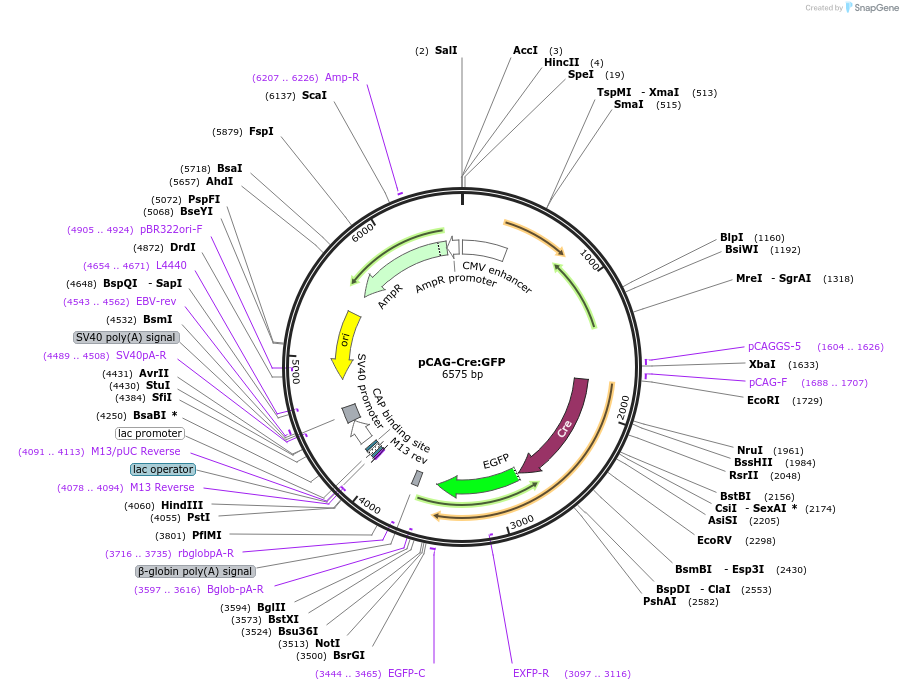-
PurposeMammalian expression of Cre recombinase fused to GFP
-
Depositing Lab
-
Sequence Information
Ordering
| Item | Catalog # | Description | Quantity | Price (USD) | |
|---|---|---|---|---|---|
| Plasmid | 13776 | Standard format: Plasmid sent in bacteria as agar stab | 1 | $89 | |
Backbone
-
Vector backbonepCAGEN
- Backbone size w/o insert (bp) 4779
-
Vector typeMammalian Expression, Cre/Lox
Growth in Bacteria
-
Bacterial Resistance(s)Ampicillin, 100 μg/mL
-
Growth Temperature37°C
-
Growth Strain(s)DH5alpha
-
Copy numberHigh Copy
Gene/Insert
-
Gene/Insert nameCre-GFP fusion protein
-
Alt nameCre recombinase
-
SpeciesBacteriophage P1
-
Insert Size (bp)1784
- Promoter CAG
-
Tag
/ Fusion Protein
- GFP (C terminal on insert)
Cloning Information
- Cloning method Restriction Enzyme
- 5′ cloning site EcoRI (not destroyed)
- 3′ cloning site NotI (not destroyed)
- 5′ sequencing primer pCAG-F
- (Common Sequencing Primers)
Resource Information
-
A portion of this plasmid was derived from a plasmid made byThe coding sequence of Cre was amplified by PCR using pxCANCre (Kanegae et al. NAR 23, 3816-3821 (1995)) obtained from Dr. Saito I (Univ. of Tokyo) as a template. GFP was from pEGFP-N1 (Clontech).
-
Articles Citing this Plasmid
Terms and Licenses
-
Academic/Nonprofit Terms
-
Industry Terms
- Not Available to Industry
Trademarks:
- Zeocin® is an InvivoGen trademark.
Depositor Comments
Kozak consensus sequence was added before the start ATG.
GFP-tag was added at the C-terminus of Cre.
Cre-GFP fusion protein is localized in the cell nucleus.
These plasmids were created by your colleagues. Please acknowledge the Principal Investigator, cite the article in which the plasmids were described, and include Addgene in the Materials and Methods of your future publications.
-
For your Materials & Methods section:
pCAG-Cre:GFP was a gift from Connie Cepko (Addgene plasmid # 13776 ; http://n2t.net/addgene:13776 ; RRID:Addgene_13776) -
For your References section:
Controlled expression of transgenes introduced by in vivo electroporation. Matsuda T, Cepko CL. Proc Natl Acad Sci U S A. 2007 Jan 16;104(3):1027-32. doi: 10.1073/pnas.0610155104 10.1073/pnas.0610155104 PubMed 17209010








